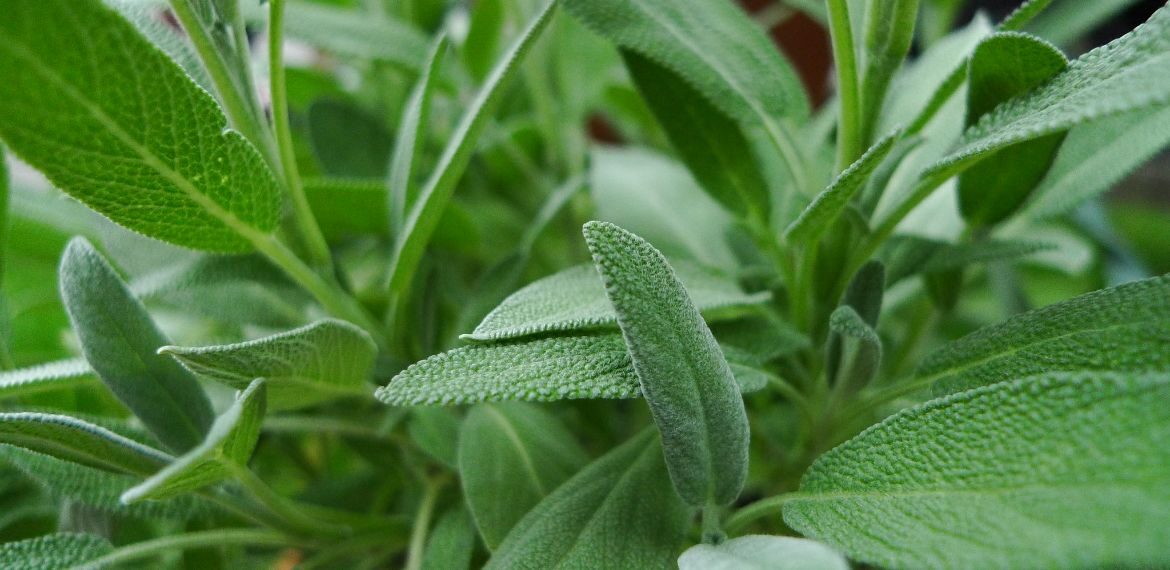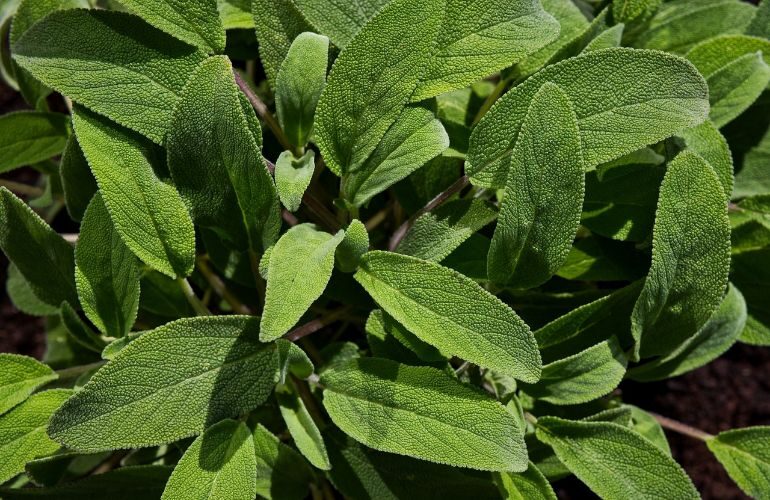Identification
Sage (Salvia officinalis) is a perennial herb that is commonly grown for its aromatic leaves. Here are some characteristics to help identify a sage plant:
- Leaves: Sage leaves are gray-green in color and have a soft, velvety texture. They are oblong or lance-shaped, and measure about 2-3 inches in length.
- Stems: Sage has woody stems that are typically square-shaped and covered in fine hairs.
- Flowers: Sage produces small, bluish-purple flowers on long, slender stems in mid-summer. The flowers are arranged in whorls and are attractive to bees and other pollinators.
- Height: Sage plants can grow to be up to 2-3 feet tall, depending on the growing conditions.
- Smell: Sage has a distinct, savory aroma that is often used in cooking and aromatherapy.
The leaves of the Sage plant (Salvia officinalis) are primarily used for medicinal purposes. The active compounds in sage leaves include volatile oils, flavonoids, and phenolic acids, which have a range of potential health benefits.
Some traditional medicinal uses of sage include:
- Soothing Sore Throats: Sage leaves are commonly used in herbal teas and throat sprays to help relieve sore throats and coughs.
- Reducing Inflammation: Sage contains compounds that have anti-inflammatory properties, which may help reduce swelling and inflammation in conditions like arthritis.
- Improving Digestion: Sage leaves are also known to stimulate digestion and help relieve stomach upset, bloating, and other digestive complaints.
- Enhancing Memory and Cognitive Function: Some research suggests that sage may help improve memory and cognitive function, particularly in older adults.
- Managing Menopausal Symptoms: Sage has been traditionally used to manage hot flashes and other menopausal symptoms, and some studies suggest that it may be effective for this purpose.
It’s important to note that while sage is generally considered safe when used in moderation, it can interact with certain medications and may not be appropriate for everyone. It’s always a good idea to speak with a healthcare provider before using any herbal remedies.
Common Name
Sage
Scientific Name
Salvia officinalis
Name in popular languages
- Spanish: Salvia or Salvia común
- French: Sauge officinale
- German: Echter Salbei
- Italian: Salvia comune
- Portuguese: Sálvia
- Dutch: Echte salie
- Swedish: Salvia
- Danish: Ægte salvie
- Norwegian: Ekte salvie
- Finnish: Salvia or Salvia officinalis
- Hindi: Salvia (साल्विया), Salviya (सल्विया), Kadhi Patta (कढ़ी पत्ता)
- Bengali: Salvia (স্যালভিয়া)
- Tamil: Sevvaai (செவ்வாய்)
- Telugu: Sage (సేజ్)
- Kannada: Sage (ಸೇಜ್)
- Malayalam: Kasthuri manjal (കസ്തൂരി മഞ്ഞൾ)
Origin and History
Sage (Salvia officinalis) is native to the Mediterranean region, where it has been cultivated for thousands of years. The ancient Greeks and Romans used sage for a variety of medicinal and culinary purposes, and it was considered a sacred herb in some cultures.
In ancient times, sage was used to treat a wide range of ailments, including digestive complaints, respiratory infections, and skin conditions. It was also used to promote longevity and improve memory and cognitive function.
Sage has been used in traditional medicine systems around the world. For example, in Traditional Chinese Medicine, sage is believed to have a cooling effect on the body and is used to treat excess heat and inflammation.
In the Middle Ages, sage was a popular remedy for a variety of ailments and was widely used in Europe. It was often used to treat plague, as it was believed to have antibacterial properties. It was also used to treat digestive complaints, menstrual cramps, and other conditions.
Today, sage is still used for a variety of health and medicinal purposes. It is commonly used to soothe sore throats and coughs, improve digestion, and relieve hot flashes and other menopausal symptoms. Some research also suggests that sage may have anti-inflammatory, antioxidant, and antimicrobial properties, which may make it useful in the treatment of a variety of conditions.
Nutritional constituents
Sage (Salvia officinalis) is a nutrient-dense herb that is rich in a variety of vitamins, minerals, and antioxidants. According to the United States Department of Agriculture (USDA), here are some of the nutritional constituents of sage per 100 grams:
- Energy: 315 kJ (75 kcal)
- Carbohydrates: 14.28 g
- Protein: 10.63 g
- Fat: 1.73 g
- Dietary fiber: 40.3 g
- Calcium: 1652 mg
- Iron: 28.1 mg
- Magnesium: 437 mg
- Phosphorus: 242 mg
- Potassium: 1070 mg
- Sodium: 43 mg
- Zinc: 2.94 mg
- Vitamin C: 32.4 mg
- Thiamin: 0.429 mg
- Riboflavin: 0.336 mg
- Niacin: 4.5 mg
- Vitamin B6: 1.71 mg
- Folate: 194 µg
- Vitamin A: 590 µg
- Vitamin E: 7.96 mg
- Vitamin K: 43.9 µg
Sage also contains a variety of bioactive compounds, including flavonoids, phenolic acids, and essential oils, which may contribute to its potential health benefits.
Medicinal or Health Benefits
Sage (Salvia officinalis) has been used for its medicinal properties for centuries. Here are some of the traditional medicinal or health benefits of sage:
- Digestive Health: Sage is known to have a calming effect on the digestive system and has been used to treat various digestive issues such as bloating, gas, and diarrhea.
- Oral Health: Sage has been used traditionally to treat oral health issues such as gingivitis, mouth ulcers, and sore throat. It is believed to have antimicrobial properties that help kill harmful bacteria in the mouth.
- Menopausal Symptoms: Sage has been used to alleviate symptoms of menopause such as hot flashes, night sweats, and mood swings. It is believed to help regulate hormones and reduce inflammation.
- Memory and Cognitive Function: Sage has been used to improve memory and cognitive function. It is believed to have a positive effect on brain function and has been studied as a potential treatment for Alzheimer’s disease.
- Skin Health: Sage has been used to treat various skin conditions such as acne, eczema, and psoriasis. It is believed to have anti-inflammatory and antimicrobial properties that can help reduce inflammation and fight off bacteria.
- Anti-Inflammatory: Sage has been studied for its anti-inflammatory properties and may be useful in treating conditions such as arthritis and asthma.
- Diabetes: Sage has been traditionally used to help regulate blood sugar levels and improve insulin sensitivity in people with diabetes.
It’s important to note that while sage has been used for centuries for its medicinal properties, more research is needed to fully understand its potential health benefits and possible side effects. It’s always a good idea to consult with a healthcare provider before using sage for medicinal purposes.
Scientific Perspective
There is some scientific research that supports the traditional use of sage for various health and medicinal purposes. Here are some examples:
- Digestive Health: A study published in the Journal of Ethnopharmacology found that sage extract had a positive effect on the digestive system and could help treat conditions such as bloating and gas.
- Oral Health: A study published in the Journal of Contemporary Dental Practice found that sage mouthwash was effective in reducing plaque and gingivitis in people with periodontitis.
- Menopausal Symptoms: A randomized controlled trial published in the journal Menopause found that taking a sage supplement significantly reduced the frequency and severity of hot flashes in menopausal women.
- Memory and Cognitive Function: A study published in the Journal of Psychopharmacology found that sage extract improved memory and cognitive function in healthy older adults.
- Skin Health: A study published in the International Journal of Cosmetic Science found that sage extract had anti-inflammatory and antioxidant properties that could help improve skin health.
- Anti-Inflammatory: A study published in the Journal of Medicinal Food found that sage extract had anti-inflammatory properties and could be useful in treating conditions such as arthritis.
- Diabetes: A study published in the journal Diabetes Care found that taking sage supplements for 3 months improved glycemic control in people with type 2 diabetes.
It’s important to note that while these studies suggest that sage may have potential health benefits, more research is needed to fully understand its effects and possible side effects. As always, it’s a good idea to consult with a healthcare provider before using sage for medicinal purposes.
FDA's perspective
The U.S. Food and Drug Administration (FDA) does not regulate herbal supplements in the same way that it regulates drugs, and as such, it does not approve or endorse the use of specific herbs or herbal products for health and medicinal purposes. However, the FDA does provide guidance on the use of herbs and herbal supplements, and it has issued warnings about some herbal products that may be harmful.
In general, the FDA recommends that consumers talk to their healthcare providers before using any herbal supplements, including sage, to ensure that they are safe and appropriate for their individual health needs. The FDA also recommends that consumers purchase herbal supplements from reputable sources and check for any potential drug interactions or side effects.




